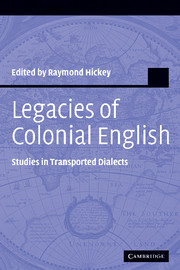Book contents
- Frontmatter
- Contents
- List of figures, maps and tables
- Contributors
- Foreword
- Introduction
- Part I Out of Britain
- Part II The New World
- 4 The emergence of American English: evidence from seventeenth-century records in New England
- 5 The language of transported Londoners: third-person-singular present-tense markers in depositions from Virginia and the Bermudas, 1607–1624
- 6 Remnant dialects in the coastal United States
- 7 Back to the present: verbal -s in the (African American) English diaspora
- 8 ‘Canadian Dainty’: the rise and decline of Briticisms in Canada
- 9 The legacy of British and Irish English in Newfoundland
- 10 The English dialect heritage of the southern United States
- 11 Solving Kurath's puzzle: establishing the antecedents of the American Midland dialect region
- 12 English dialect input to the Caribbean
- Part III The southern hemisphere
- Part IV English in Asia
- Appendix 1 Checklist of nonstandard features
- Appendix 2 Timeline for varieties of English
- Appendix 3 Maps of anglophone locations
- Glossary of terms
- General references
- Index of names
- Index of languages and varieties
- General index
6 - Remnant dialects in the coastal United States
Published online by Cambridge University Press: 22 September 2009
- Frontmatter
- Contents
- List of figures, maps and tables
- Contributors
- Foreword
- Introduction
- Part I Out of Britain
- Part II The New World
- 4 The emergence of American English: evidence from seventeenth-century records in New England
- 5 The language of transported Londoners: third-person-singular present-tense markers in depositions from Virginia and the Bermudas, 1607–1624
- 6 Remnant dialects in the coastal United States
- 7 Back to the present: verbal -s in the (African American) English diaspora
- 8 ‘Canadian Dainty’: the rise and decline of Briticisms in Canada
- 9 The legacy of British and Irish English in Newfoundland
- 10 The English dialect heritage of the southern United States
- 11 Solving Kurath's puzzle: establishing the antecedents of the American Midland dialect region
- 12 English dialect input to the Caribbean
- Part III The southern hemisphere
- Part IV English in Asia
- Appendix 1 Checklist of nonstandard features
- Appendix 2 Timeline for varieties of English
- Appendix 3 Maps of anglophone locations
- Glossary of terms
- General references
- Index of names
- Index of languages and varieties
- General index
Summary
Introduction
Along the southern and mid-Atlantic coasts of the United States, there are a number of remnant dialect communities, that is, longstanding communities of speakers who have been geographically or culturally isolated from surrounding populations for extended periods of time. These include island communities in the Chesapeake Bay of Maryland and Virginia, the barrier islands off the coast of North Carolina, and the Sea Islands off the coast of South Carolina and Georgia, as well as inland communities which have been physically or socioculturally isolated from neighbouring communities. Given the relatively early habitation of some of these areas by English-speaking colonists and subsequent periods of separation from other groups, these situations provide ideal settings for considering the nature of the development and maintenance of transported dialects in relative isolation.
Our recent research on remnant dialect communities has included a sample of island communities populated primarily by Anglo-Americans on the Outer Banks of North Carolina (Wolfram and Schilling-Estes 1995, 1997; Wolfram, Hazen and Schilling-Estes 1999) and in the Chesapeake Bay (Schilling-Estes 1997, 2002; Schilling-Estes and Wolfram 1999). In addition, we have investigated communities involved in long-standing interethnic contact situations, including contact between African Americans and Anglo-Americans in mainland Hyde County adjacent to the Outer Banks of North Carolina (Green 1998; Wolfram, Thomas and Green 2000; Wolfram and Thomas 2002), and tri-ethnic contact involving African Americans, Lumbee Native Americans and Anglo-Americans in Robeson County, in the Coastal Plains region of North Carolina (Wolfram 1996; Dannenberg and Wolfram 1998; Dannenberg 1999, 2002; Wolfram and Dannenberg 1999; Wolfram, Dannenberg, Knick and Oxendine 2002; Schilling-Estes 1999, 2000a).
- Type
- Chapter
- Information
- Legacies of Colonial EnglishStudies in Transported Dialects, pp. 172 - 202Publisher: Cambridge University PressPrint publication year: 2005
- 5
- Cited by

